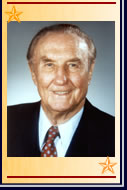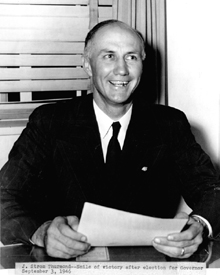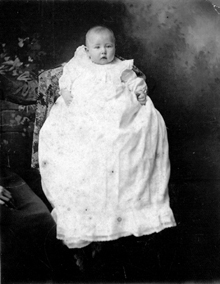 | Asheville business & community directory |
|
This is an archived page that may contain outdated or incorrect information. Please visit www.Asheville.com for the latest news, events, and more.
 Former Republican Sen. James Strom Thurmond of South Carolina, 100, died at 9:45 PM EDT, on June 26, 2003, in Edgefield, SC. The nation's longest serving senator, Thurmond died at Edgefield County Hospital, where he had taken up residence in January 2003 after leaving the Senate.
Former Republican Sen. James Strom Thurmond of South Carolina, 100, died at 9:45 PM EDT, on June 26, 2003, in Edgefield, SC. The nation's longest serving senator, Thurmond died at Edgefield County Hospital, where he had taken up residence in January 2003 after leaving the Senate. Born in Edgefield, SC., on Dec. 5, 1902, Thurmond's career spanned the political gamut, ranging from school superintendent, judge, and state senator to governor and presidential candidate and US senator. Thurmond was first elected to the U.S. Senate in 1954. Running as a write-in candidate, he defeated Democrat Edgar Brown in the primary election. In 1997, he broke two US Senate records: the oldest member to serve (94) and the longest time served (43 years). Thurmond served in 25 congressional terms, spanning from the 83rd Congress to the 107th. He served on or chaired many powerful committees, including Armed Services, Veterans Affairs and Judiciary.
He appointed more women to public office than in any equivalent period in the state's history, including the first woman appointed to the State Industrial Commission. In addition, he appointed the first African-American to the State Board of Health. Objecting to the 1948 nomination of Harry S. Truman for president by the National Democratic Party, Thurmond ran as the presidential candidate of the States' Rights Democratic Party and won four southern states (Alabama, Louisiana, Mississippi and South Carolina) and 39 electoral votes. He ran unsuccessfully against Olin D. Johnston for the US Senate in 1950, but was elected on his next try in 1954.
In 1964, Thurmond switched allegiances from the Democratic to the Republican Party and aided Barry Goldwater in his unsuccessful bid for the presidency against Lyndon B. Johnson. Later he was instrumental in forming the "Southern strategy" that won the White House for Richard M. Nixon in 1968. The son of the late John William and Eleanor Gertrude Strom, Thurmond was educated in Edgefield County public schools, and in 1923 earned a Bachelor of Science degree in horticulture from Clemson College (now Clemson University, which houses Thurmond's papers and memorabilia in the Strom Thurmond Institute of Government and Public Affairs). Upon hearing of Senator Thurmond�s death, Clemson University President James F. Barker expressed his personal sorrow and extended condolences on behalf of the university. �I am truly saddened to hear this news,� said Barker. �While the state and nation mourn this loss, Senator Thurmond�s passing is especially poignant for all of us at Clemson University because he was one of our own � a remarkable alumnus and member of the Clemson family. Because of the educational and service-oriented foundation he received here as a member of the Clemson cadet corps, he went on to embody the spirit of and demonstrate a commitment to service throughout his lifetime.�
Thurmond was elected to the SC Senate in 1933, where he drafted the first legislation to provide state assistance to the aged, blind and to disadvantaged children. He advocated new laws for rural electrification, improvement of the state educational system, soil conservation and farm worker safety. He resigned from the State Senate in 1938 to successfully run for the 11th Circuit Court judgeship, but stepped down, temporarily, in 1941 when the United States entered World War II. Thurmond served with the Civil Affairs section of the First Army headquarters and participated in the Normandy invasion on assignment with the 82nd Airborne Division. Thurmond returned to the bench briefly before resigning to run for governor of South Carolina, an election he won over 10 opponents. Thurmond is survived by his estranged wife, Nancy Moore Thurmond (the couple separated in 1991); sons James Strom II and Paul Reynolds; and a daughter, Juliana Thurmond Whitmer. The Thurmond's first grandchild, Martin Taylor Whitmer III, was born June 16, 2003, to Juliana and Martin Whitmer. The Thurmonds had another daughter, Nancy Moore Thurmond, who died in an automobile accident on April 14, 1993.
|

 Thurmond served as South Carolina governor from 1947 to 1951. His one term was marked by the passage of legislation to reorganize the state government, establish a state pardon and parole board (limiting the governor's pardoning power), remove the poll tax, grant incentives to new industries, assist education within the state, and enforce laws
concerning dual-office holding.
Thurmond served as South Carolina governor from 1947 to 1951. His one term was marked by the passage of legislation to reorganize the state government, establish a state pardon and parole board (limiting the governor's pardoning power), remove the poll tax, grant incentives to new industries, assist education within the state, and enforce laws
concerning dual-office holding.  Thurmond is perhaps best known as the originator of the 1956 "Southern Manifesto" against the 1954 US Supreme Court desegregation ruling. He holds the record for the longest filibuster in the U.S. Senate history, during which he spoke against the 1957 civil rights bill for 24 hours and 18 minutes.
Thurmond is perhaps best known as the originator of the 1956 "Southern Manifesto" against the 1954 US Supreme Court desegregation ruling. He holds the record for the longest filibuster in the U.S. Senate history, during which he spoke against the 1957 civil rights bill for 24 hours and 18 minutes.  While teaching, coaching, and serving as superintendent of education for Edgefield County, Thurmond took correspondence courses in law and studied with his father. He was admitted to the South Carolina Bar in 1930 and served as the Edgefield city and county attorney from 1930-1938.
While teaching, coaching, and serving as superintendent of education for Edgefield County, Thurmond took correspondence courses in law and studied with his father. He was admitted to the South Carolina Bar in 1930 and served as the Edgefield city and county attorney from 1930-1938.